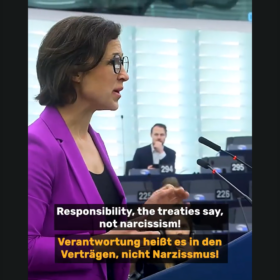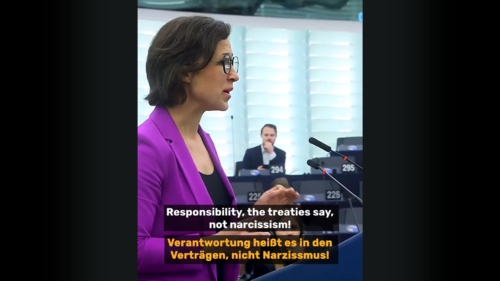This article was originally published by Heinrich Böll Stiftung Brussels.
When I was in eighth grade, my German teacher asked me to choose a poem that meant a lot to me. After giving it much thought, I picked out this one sentence by Andreas Tenzer. It was 1999, exactly 10 years after the fall of the Berlin Wall. Today, 20 years later, we are celebrating the 30th anniversary of the fall of the wall. Meanwhile, I have moved to Berlin and have lived for the last 13 years in close proximity to the former headquarters of the official state security service of the German Democratic Republic. The events of the Peaceful Revolution still move me to this day. The fact that people managed to bring down a repressive surveillance state through peaceful resistance impresses me. My admiration goes to all those who, despite state propaganda, have developed a different vision of living together in and with freedom. Their strength and courage are also my motivation to fight against injustice in the world.
Peaceful fight for change
A number of former civil rights activists took up prominent political positions in reunited Germany, including Wolfgang Thierse, Marianne Birthler and Rainer Eppelmann. Not everyone who was involved in the Peaceful Revolution still lived in the GDR in 1989. Some succeeded in fleeing into exile, some were forcibly exiled, and others came to the West via an exchange of prisoners. Sometimes temporary exile is the last option to continue living one’s own resistance. Often the solidarity of support groups in the West gave the necessary strength to those who remained. This is not only true for inner-German history.
Today people across the globe fight peacefully for change. For the freedom to be a woman and to choose one’s spouse. For the freedom to cultivate one’s own land or forest. For the freedom to name corruption. For the freedom to express one’s opinion and views. For the freedom to demonstrate together with other people. They are the ones who can achieve change on the ground and mobilise people – and they deserve our solidarity. Precisely because they are coming under increasing pressure.
In 2018, more than 300 human rights defenders were murdered because of their work. More than ever before. Half of them had received death threats. They all fought peacefully for their rights.
The Geneva Refugee Convention vis-à-vis procedures
20 years ago, the international community agreed on international standards for the protection of human rights defenders. The European Union has drawn up a programme to this end. It is intended to protect human rights defenders through training, advice, security infrastructure and, if necessary, temporary resettlement in the country or region. If these measures do not help, a situation that is sadly becoming more frequent, a temporary stay in European exile is recommended. Most human rights defenders never wanted to go into exile. They committed themselves to the fight for freedom in their homeland and do not want to be missing on the ground. However, some of them need a temporary break. To gather new strength, to network and to eventually go back emboldened, or in some cases to simply just survive.
These people experience persecution in the classic sense of the Geneva Refugee Convention. They are our partners in the fight for democracy and freedom worldwide. Yet when they need our help, we leave them far too often in the lurch. The reason behind this is a mere bureaucratic banality, so far no special visa procedure exists for such cases. Thus, in the absence of formalized procedures, the EU member states engage in lengthy political bargaining over which country is to take in the persecuted persons. In many cases, this means that in the end almost no one will make it to the EU. Something of which I am deeply ashamed.
Pragmatic solutions
Individual cities like Hamburg, Amsterdam, Paris and Berlin are already working on pragmatic solutions to the problem. They are metaphorically speaking building bridges over the walls by awarding scholarships to threatened human rights defenders and, where necessary, their families. They invite them to be guests of the city for a certain period for them to then, if the situation allows it, return home strengthened.
I hope that 30 years after the Peaceful Revolution in Germany many European cities and regions will follow suit. Also, that the number of people fighting in the European Parliament for a change in the current visa regime will increase. So that more people get the right they deserve, a break in exile and security for their families. It is precisely because of our inner-German history that I expect the government of this reunited Germany to take the lead in a European movement. Because experience shows one thing: once exiles return to their home countries, and that is what they do in the vast majority of cases, they, in turn, tend to build bridges within their countries and to Europe.












